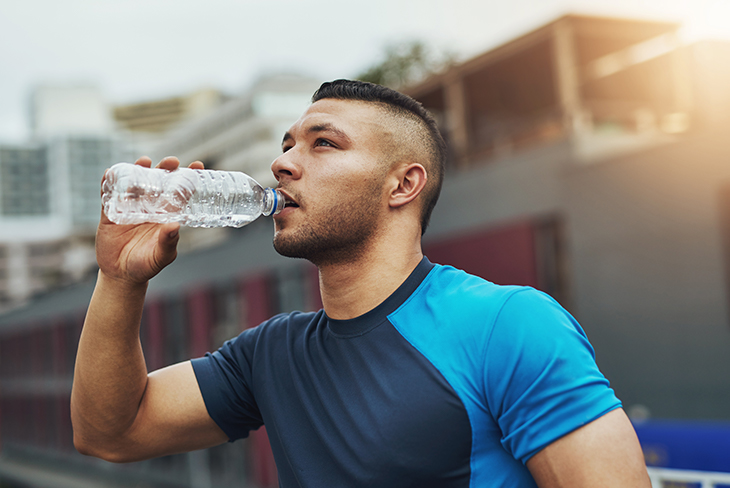The benefits of drinking water

When the temperatures rise, you need to keep hydrated, whether you’re playing sports, travelling or simply sitting in the sun.
Many people are surprised to learn that the body is made up of about 70% water. Our brain and heart each have a liquid content of around 70%, while our lungs are 80% fluids. Even our skin and bones contain water.
So we need to replenish the water content of our bodies regularly so that all organs can perform optimally: blood flows easily through veins and arteries, skin and mucous membranes stay hydrated and, on a cellular level, the balance of salts, minerals and sugars (electrolytes) is kept stable. If this balance is disrupted, the body cannot function properly and you feel ill. The only way to recover when this balance is upset is to drink a solution containing electrolytes: the ideal balance of salt, sugar and minerals (potassium and sodium) you find in sports drinks and rehydration solutions.
‘We lose water through sweating, which cools the body to its ideal temperature. In hot weather, we can lose around 500ml per hour, which is why we must drink regardless of whether we feel thirsty or not,’ says Johannesburg dietitian Amanda van Huyssteen, who has rooms at Life Wilgeheuwel Hospital. However, it’s important to note that outside temperatures will affect how much water you need at any given time.
Side effects of dehydration
If you exert yourself, or it’s very hot outside, and you haven’t taken in sufficient fluids, you might be on your way to experiencing some very unpleasant and potentially dangerous side effects. Minor ones include headaches, dizziness and an inability to concentrate. However, if you get heatstroke, you will most likely experience nausea and vomiting, which need to be treated immediately. Most importantly, dehydration also affects the heart, making it work that much harder to pump blood around the body, sometimes leading to a rise in blood pressure.
‘If the volume of blood in the body decreases, your heart has to beat faster,’ says Amanda. ‘With too little fluid in the body, your blood becomes thicker and more concentrated and cannot flow easily. Blood pressure increases because the body squeezes the blood vessels to help circulate the blood.’
Although the standard recommendation of eight glasses of water per day has come under scrutiny by some experts, we ought to consume hydration drinks regularly throughout the day, especially if you’re physically active or it’s hot outside. Writers of the chapter on water in the Food-Based Dietary Guidelines for South Africa say we shouldn’t drink according to a fixed drinking regimen, but many health practitioners prefer to stick to the eight-glass recommendation.
Enjoy your fluids
Experts agree that water is the best choice, but it’s not everyone’s favourite. Amanda advises people drink plain sparkling mineral water or soda water, fruit juice, and low-fat or fat-free milk, rather than drinks loaded with sugar. Some scientists also believe that tea and coffee count as hydration drinks, as long as your body is accustomed to them.
You can also make your own flavoured water. Amanda recommends adding sliced lemon, mint leaves or any fresh herbs, strawberries or cucumber slices. Keep in mind that hydrating foods also provide water.
Rehydrate the body with foods like yoghurt, apples, pears and oranges. Vegetables like carrots and cooked broccoli are 80 to 89% water. Strawberries, sweet melon, watermelon, celery and lettuce contain 90 to 99% water. ‘If you eat a varied diet that includes plenty of fruit and vegetables, you naturally increase your intake of fluids.’
If you prefer hot-water drinks, there are plenty of options for you too. ‘Add fresh ginger and lemon slices to boiling-hot water, let it steep for a while and drink. You can also use apple slices and cinnamon sticks in hot water and sweeten with a little honey to make them really tasty,’ says Amanda.
‘My advice for people who struggle to drink water is to always have water on hand,’ she says. ‘Don’t rely on walking to the water cooler or tap to get a glass of water – keep a jug of water on your desk and a bottle of water (or flavoured water) in the car.’
The writers of Food-Based Dietary Guidelines for South Africa, however, want South Africans to be aware that drinking too much water can cause problems. The document states that we should drink according to our thirst, but if you’re someone who sweats a great deal doing sport or manual work, you ought to be aware of how much fluid you need to keep up your performance.
The information is shared on condition that readers will make their own determination, including seeking advice from a healthcare professional. E&OE. Life Healthcare Group Ltd does not accept any responsibility for any loss or damage suffered by the reader as a result of the information provided.

